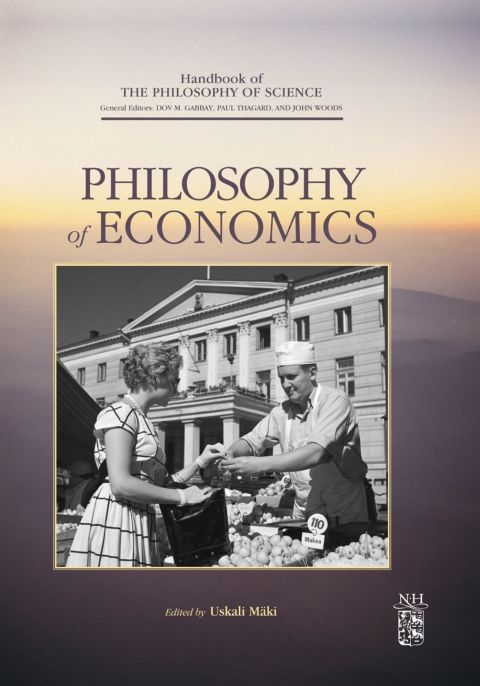Description
Efnisyfirlit
- FrontCover
- Philosophy of Economics
- Copyright
- Dedication
- General Preface
- Contents
- Preface
- Contributors
- Part A : General Philosophical Themes
- Realism and Antirealism about Economics
- 1 Introduction
- 2 Scientific Realism in Conventional Philosophy of Science
- 3 Ingredients of a Minimal Scientific Realism
- 4 Commonsensibles and Their Modifications in Economic Modelling
- 5 Social Construction (What?) of What?
- 6 Conclusion
- Bibliography
- The Rise and Fall of Popper and Lakatos in Economics
- 1 Introduction
- 2 Early Engagements with Popper
- 3 Lakatos and The Emergence of Economic Methodology
- 4 The Movement From Popper and Lakatos
- 5 Appraising Economic Theories
- 6 Methodology After Lakatos
- 7 Conclusions
- Acknowledgements
- Bibliography
- Models and Modelling in Economics
- 1 Introduction
- 2 Nature of Economic Models
- 3 Working with Models
- 4 Conclusions: From Models to Modelling
- Acknowledgements
- Bibliography
- Economic Theory and Causal Inference
- 1 Reductionist and Structuralist Accounts of Causality
- 2 Structual Estimation and Causality
- 3 The Assault on Macroeconometric Models
- 4 Inferring Causes from Interventions
- 5 Graph-Theoretic Accounts of Causal Structure
- 6 A Synthetic Program for Uncovering the Causal Structure of Vars
- Bibliography
- Naturalism and The Nature of Economic Evidence
- 1 Naturalism and Evidence
- 2 Nonexperimental Evidence
- 3 Experimental Evidence
- 4 Evidence and Unrealistic Causal Models
- Conclusion
- Bibliography
- Some Issues Concerning The Nature of Economic Explanation
- 1 Some Controversies About Explanation
- 2 Formal Criteria For Explanation in Economics
- 3 Theoretical Entities and Explanation
- 4 When Do Models Explain?
- 5 Macro and Microexplanation
- 6 Functional Explanation and Evolutionary Economics
- 7 The Nature of Economic Causes
- 8 Conclusion
- Bibliography
- The Unreasonable Efficacy of Mathematics in Modern Economics
- 1 The Classical Arguments
- 2 The Role and Functions of Mathematics in Neoclassical Economics
- 3 Post-1980 Developments in Alternative Possibilities for Mathematical Formalization in Economics
- 4 A Revival of Philosophy of Mathematics for Economics?
- Bibliography
- Feminist Philosophy of Economics
- Introduction
- What Makes an Economic Inquiry Feminist?
- Is Rational Choice Theory Androcentric?
- Values and Objectivity in Economics
- “Critical Realism:” A Contested View in Feminist Philosophy of Economics
- Conclusion
- Bibliography
- The Positive-Normative Dichotomy and Economics
- 1 Introduction to The Positive-Normative Dichotomy
- 2 The History of The Positive-Normative Dichotomy in Economics
- 3 Normative and Ethically Normative
- 4 The Entanglement of Positive and (Ethically) Normative
- 5 Conclusion
- Acknowledgements
- Bibliography
- Economic Theory, Anti-Economics, and Political Ideology
- 1 Introduction
- 2 Anti-Economists and Markets
- 3 Economic Theory and The Normative Status of The Market
- 4 Non-Ideological Economics
- Bibliography
- Social Scientific Naturalism and Experimentation in Economics
- 1 Is Game Theory Testable?
- 2 Difficulties in Testing Game Theory
- 3 Determining Preferences
- 4 The Implications of Preference Complexities
- 5 Some Implications for Social Scientific Naturalism
- 6 Conclusions
- Acknowledgements
- Bibliography
- Part B : Specific Methods, Theories, Approaches, Paradigms, Schools, Traditions
- The Philosophy of Economic Forecasting
- 1 Introduction
- 2 Prerequisites
- 3 Forecasting, Prediction, and Economics
- 4 The Purpose of Economics
- 5 Philosophical Questions
- 6 Causality and Control
- Bibliography
- Philosophy of Econometrics
- 1 Introduction
- 2 Relevant Philosophical/Methodological Issues
- 3 Philosophy of Science and Empirical Modeling
- 4 Statistical Inference and Its Foundational Problems
- 5 Error-Statistics (E-S) and Inductive Inference
- 6 Statistical Adequacy and The Reliability of Inference
- 7 Philosophical/Methodological Issues Pertaining to Econometrics
- 8 Summary and Conclusions
- Acknowledgements
- Bibliography
- Measurement in Economics
- 1 The Representational Theory of Measurement
- 2 Axiomatic Representational Theory of Measurement
- 3 Empirical Representational Theory of Measurement
- 4 Instrument Measurement
- 5 Reliable Measurement Results
- 6 Economic Modeling
- Acknowledgements
- Bibliography
- Geographical Economics and Its Neighbours — Forces Towards and Against Unification
- 1 Introduction
- 2 Geographical Economics and Its Neighbours
- 3 Explanatory Unification
- 4 Intra-Disciplinary Unification of Location, Trade and Growth
- 5 Inter-Disciplinary Unification: Economics Imperialism
- 6 Unrealistic Assumptions, Idealizations and Explanatory Power
- 7 Concluding Remarks
- Acknowledgements
- Bibliography
- The Homo Economicus Conception of The Individual: An Ontological Approach
- 1 Existence as a Category of Investigation
- 2 What Exists in Economics?
- 3 The Homo Economicus Conception of the Individual
- 4 The Problem of Multiple Selves
- 5 Three Precursor Social Identity Arguments
- 6 Recent Social Identity Arguments
- 7 The Conception of The Individual in Recent Economics
- Bibliography
- Rational Choice and Some Difficulties for Consequentialism
- 1 Introduction
- 2 Transitivity
- 3 Independence
- 4 Difficulties with The Formalisation of Non-Dictatorship
- 5 The Identification Problem
- 6 Summary
- Bibliography
- Rational Choice, Preferences Over Actions and Rule-Following Behavior
- 1 Introduction
- 2 Rationality Principle and Rationality Hypotheses in Economics
- 3 Adjusting the Utility Function
- 4 Preferences Over Actions and Rule Following
- 5 The Rationale of Rule-Following Behavior
- 6 The Explanation of Rule-Following Behavior
- 7 Conclusion
- Acknowledgements
- Bibliography
- Philosophy of Game Theory
- 1 Introduction
- 2 Some Basic Concepts
- 3 Game Theory as a Normative Theory Of Rationality
- 4 Game Theory as a Predictive Theory
- 5 Conclusion
- Bibliography
- An Embarrassment of Riches: Modeling Social Preferences in Ultimatum Games
- 1 Social Preferences
- 2 Analysis Based on Bug
- 3 Variants to Bug
- 4 Conclusion
- Bibliography
- Experimentation in Economics
- 1 Introduction
- 2 Theory and Experiment
- 3 Experimental Inferences
- 4 External Validity
- 5 The Philosophical Relevance of Experimental Economics‘ Results
- 6 Other Issues and Readings
- Acknowledgements
- Bibliography
- Behavioral Economics
- 1 Introduction
- 2 The Intellectual Backdrop
- 3 Psychological Approaches During The Late Neoclassical Period
- 4 The “New” Behavioral Economics
- 5 The Methods of Behavioral Economics
- 6 Current Directions
- 7 Conclusion
- Acknowledgements
- Bibliography
- The Economic Agent: Not Human, But Important
- 1 Introduction
- 2 Economic Agency
- 3 Animal Agents
- 4 The Heartland of Economics
- 5 Behavioral Economics and Neuroeconomics: The Molar and The Molecular
- 6 People as Coordinating Equilibria
- Bibliography
- Ontological Issues in Evolutionary Economics: The Debate Between Generalized Darwinism and The Conti
- Introduction
- Conclusions
- Bibliography
- Public Choice: A Methodological Perspective
- Introduction and Overview
- 1 Homo Oeconomicus Goes Politics
- 2 Normative Public Choice
- Conclusions
- Bibliography
- Judgment Aggregation: A Short Introduction
- 1 Introduction
- 2 A Problem of Majority Inconsistency
- 3 The Basic Model of Judgment Aggregation
- 4 A General Impossibility Result
- 5 Avoiding the Impossibility
- 6 The Relationship to Other Aggregation Problems
- 7 Concluding Remarks
- Acknowledgements
- Bibliography
- The Economics of Scientific Knowledge
- 1 The Idea of an Economics of Scientific Knowledge
- 2 The Optimisation Paradigm
- 3 Epistemic Utility Approaches
- 4 The Exchange Paradigm
- 5 Social Mechanisms for Knowledge Production
- Acknowledgements
- Bibliography
- Index of Names
- General Index







Reviews
There are no reviews yet.